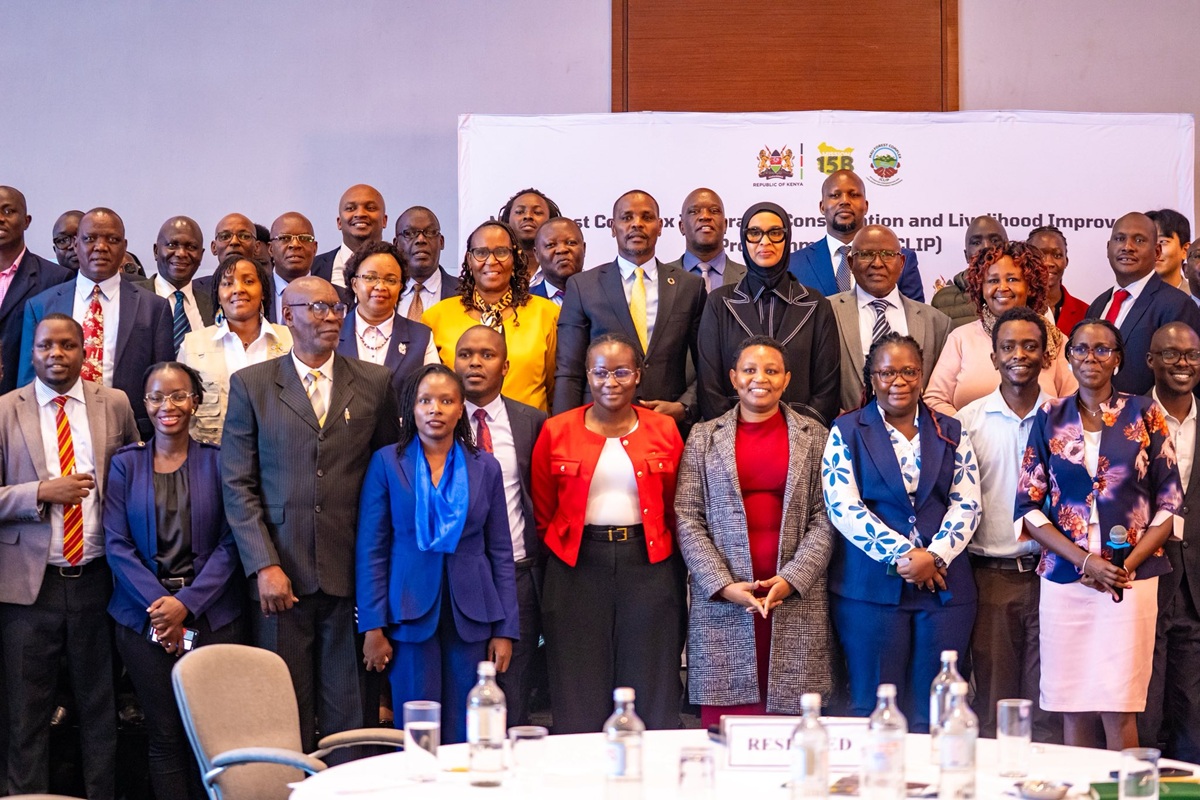On January 24, 2025, Egerton University took a monumental step towards becoming a regional leader in biotechnology and genetic engineering research. The Project Contract Implementation Team (PCIT) officially handed over the project construction site to the identified contractor, marking the beginning of the establishment of the International Centre for Genetic Engineering and Biotechnology Regional Research Centre (ICGEB RRC). This development involves the repurposing of part of the stalled Agronomy Complex into specialized laboratories and research spaces, setting the stage for a world-class research hub in East Africa.
 DVC ARE Leading the Ceremony: Prof. Bernard Aduda, Deputy Vice-Chancellor (Academics, Research & Extension), centre, officially hands over the project site to the contractor, marking the start of the ICGEB RRC establishment at Egerton University.
DVC ARE Leading the Ceremony: Prof. Bernard Aduda, Deputy Vice-Chancellor (Academics, Research & Extension), centre, officially hands over the project site to the contractor, marking the start of the ICGEB RRC establishment at Egerton University.
The handing-over ceremony was led by Prof. Bernard Aduda, the Deputy Vice-Chancellor (Academics, Research & Extension) and Chairperson of the PCIT. It brought together key stakeholders, including project consultants, contractors, and the Egerton University project implementation team. The event underscored the university’s commitment to fostering scientific research and innovation in the region.
Project Timeline and Implementation
The initiative, titled Redesigning and Upgrading the ICGEB RRC at Egerton University to Biosafety Level 2 (BSL2) Status, will be executed in multiple phases, with the first phase scheduled to take 52 weeks. The phased approach ensures meticulous planning and resource allocation to meet international research standards.
State-of-the-Art Laboratories for Cutting-edge Research
A significant part of this ambitious project involves the renovation and upgrade of the existing Agronomy Complex to accommodate Biosafety Level 2 (BSL2) laboratories. The facility will include research laboratories equipped for genetic engineering and biotechnology, specialized spaces for molecular plant pathology, crop breeding, and bio-fortification studies. It will also feature offices, meeting rooms, and collaborative research spaces to foster regional and international partnerships. Ensuring BSL2 certification is critical, as it guarantees compliance with global biosafety protocols, enabling researchers to conduct advanced studies safely and securely.
Scientific and Regional Impact
The ICGEB RRC at Egerton University is poised to transform scientific research and regional development in East Africa. The Centre will focus on combating crop diseases through molecular plant pathology research, investigating pathogen infection mechanisms to develop disease-resistant crops and reducing reliance on harmful chemicals. It will enhance food security by employing marker-assisted selection and Genome-Wide Association Studies (GWAS) to facilitate the breeding of high-yielding, climate-resilient crop varieties to meet the growing population’s needs.
 Agronomy Complex (Interior View): Inside the Agronomy Complex, where advanced laboratories for genetic engineering and biotechnology will soon take shape.
Agronomy Complex (Interior View): Inside the Agronomy Complex, where advanced laboratories for genetic engineering and biotechnology will soon take shape.
To address hidden hunger, bio-fortification initiatives will improve the nutritional value of staple foods like maize and cassava, ensuring better public health outcomes. The Centre will also promote food safety through advanced molecular diagnostics, identifying biological hazards, mycotoxins, and chemical residues in food to strengthen agricultural value chains. Additionally, it will build regional capacity by training scientists and collaborating with universities to enhance expertise in genetic engineering and biotechnology. By improving agricultural productivity and creating jobs, the ICGEB RRC will attract investments and foster sustainable development. Furthermore, it will explore East Africa’s rich biodiversity for sustainable biopesticides and natural products, contributing to environmental conservation and a circular economy approach in agriculture.
Beneficiaries of the ICGEB RRC
The impact of the ICGEB RRC will extend to a diverse range of stakeholders, including students who will gain access to postgraduate training programs and research mentorship, enhancing their expertise and employability in biotechnology and life sciences. Researchers will benefit from state-of-the-art laboratories, enabling groundbreaking research that contributes to global scientific advancements. Industry partners will collaborate with the Centre to drive innovation and technology transfer, leading to the commercialization of biotechnology products. Policymakers will gain evidence-based research to inform agricultural and biotechnology policies, ensuring responsible and ethical practices. Universities and technical institutions will also benefit from partnerships with the Centre, facilitating knowledge exchange and fostering dynamic research environments.
 Agronomy Complex (Exterior View): A glimpse of the Agronomy Complex, soon to be transformed into a state-of-the-art Biosafety Level 2 research facility.
Agronomy Complex (Exterior View): A glimpse of the Agronomy Complex, soon to be transformed into a state-of-the-art Biosafety Level 2 research facility.
Sustainability and Future Prospects
The long-term success of the ICGEB RRC will depend on sustainable funding, strategic partnerships, and continuous innovation. The Centre aims to position itself as a leading biotechnology hub in Africa through government and external funding, financial support from the Government of Kenya, international grants, and ICGEB’s global network. Strengthening ties with academic institutions, research organizations, and industry players will foster collaborations. The Centre will also focus on technology transfer and commercialization, transforming research outcomes into practical solutions for food security and economic growth.
Once fully operational, the ICGEB RRC will be comparable to leading research institutions like the International Livestock Research Institute (ILRI) and the International Centre of Insect Physiology and Ecology (ICIPE). However, its unique government-backed model will distinguish it as a powerhouse for genetic engineering and biotechnology in Africa.
Conclusion
The establishment of the ICGEB RRC at Egerton University is a game-changer for scientific research, agricultural development, and economic growth in East Africa. By addressing pressing challenges such as food security, climate change, and malnutrition, the Centre is set to make a lasting impact on the region. As construction begins, stakeholders eagerly anticipate a future where cutting-edge biotechnology research drives sustainable development, placing Kenya at the forefront of global scientific innovation.
Article by:







